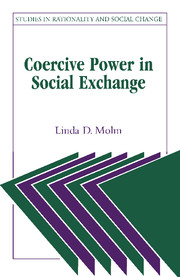Book contents
- Frontmatter
- Contents
- LIST OF FIGURES AND TABLES
- PREFACE AND ACKNOWLEDGMENTS
- 1 Introduction and overview
- 2 Social exchange and power
- 3 Punishment and coercion
- 4 An experimental setting for studying power in exchange relations
- 5 The early research: experimental tests and theoretical puzzles
- 6 The structural determination of power use
- 7 Dependence and risk: structural constraints on strategic power use
- 8 Injustice and risk: normative constraints on strategic power use
- 9 The effects of coercion: compliance or conflict?
- 10 A theory of coercion in social exchange
- 11 Conclusions and implications
- APPENDIX I Definitions of basic concepts of social exchange
- APPENDIX II The experimental instructions for the standardized setting
- REFERENCES
- NAME INDEX
- SUBJECT INDEX
2 - Social exchange and power
Published online by Cambridge University Press: 06 July 2010
- Frontmatter
- Contents
- LIST OF FIGURES AND TABLES
- PREFACE AND ACKNOWLEDGMENTS
- 1 Introduction and overview
- 2 Social exchange and power
- 3 Punishment and coercion
- 4 An experimental setting for studying power in exchange relations
- 5 The early research: experimental tests and theoretical puzzles
- 6 The structural determination of power use
- 7 Dependence and risk: structural constraints on strategic power use
- 8 Injustice and risk: normative constraints on strategic power use
- 9 The effects of coercion: compliance or conflict?
- 10 A theory of coercion in social exchange
- 11 Conclusions and implications
- APPENDIX I Definitions of basic concepts of social exchange
- APPENDIX II The experimental instructions for the standardized setting
- REFERENCES
- NAME INDEX
- SUBJECT INDEX
Summary
This chapter lays the theoretical groundwork for the project. Here I describe the basic concepts, assumptions, and principles of social exchange theory and its conception of power. My discussion is based primarily on the contributions of Richard Emerson (1962, 1972a, 1972b), whose theory of power-dependence relations provides the framework for this work. I also draw on the insights of Thibaut and Kelley (1959), whose early treatment of power-dependence relations strongly influenced Emerson's subsequent work; of Homans ([1961] 1974), who is considered by many to be the founding father of sociological exchange theory; and of Blau (1964), whose conception of social exchange as nonnegotiated – the terms and timing of which are left unspecified – corresponds most closely to my own.
My discussion in this chapter is limited to reward-based exchange, the traditional focus of social exchange theories. In the next chapter I evaluate this restriction and discuss the consequences of removing it for the assumptions and principles introduced here.
The concept of social exchange
The conception of social interaction as social exchange comes, of course, from the example of economic exchange. As anthropologists recognized as early as the 1920s (Malinowski 1922; Mauss 1925), many forms of social interaction outside of the economic marketplace can be conceptualized as an exchange of benefits. “Neighbors exchange favors; children, toys; colleagues, assistance; acquaintances, courtesies; politicians, concessions” (Blau 1964:88).
- Type
- Chapter
- Information
- Coercive Power in Social Exchange , pp. 11 - 43Publisher: Cambridge University PressPrint publication year: 1997
- 2
- Cited by



